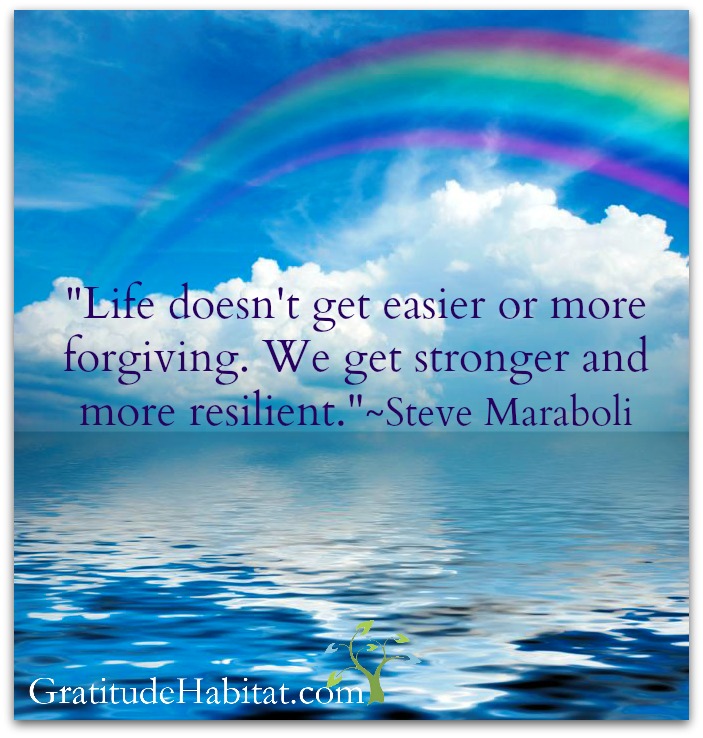Living In Gratitude: Resilience
I am not what happened to me, I am what I choose to become. ~Carl Gustav Jung
Resilience is our capacity for stress-related growth, to recover quickly from difficulties.
There are two distinct aspects to resilience:
- Durability or hardiness, which is 0ur ability to manage daily stressors and hassles successfully
- Bouncing Back, our capacity to effectively recover and grow from major life adversities like death or divorce
We can build and reinforce our resilience muscles by focusing on three key things.
-
THINK DIFFERENTLY
By recognizing and understanding how we think about adversity, stress and challenging scenarios, we can alter how we think about them and as such, how we react to them. Our thinking runs along a sliding scale from optimism to pessimism.
People who have a more pessimistic way of thinking tend to impart personalization, permanence and pervasiveness on stressful situations. They tell themselves:
“This problem will be around forever. It will affect my entire life and its all my fault.”
Consistent pessimistic thinking increases our likelihood of depression, anxiety, hopelessness and helplessness.
Our inner critic also steers counterproductive thinking including:
- A belief that everything needs to be perfect
- A fixed, immovable mindset
- Feeling every challenge is a tragedy
Our ability to be resilient in the face of obstacles is buoyed when we turn our inner critic into our ‘inner coach’.
To move our thoughts to ones that are more optimistic and bolster our ability to deal with and recover from all types of stressors, we can ask ourselves these questions:
- “How will I feel about this situation a year from now?”
- “Where do I possess some control, influence or leverage in this situation?”
- “What would I tell my partner, friend or child if they encountered this issue?”
- “How is my current thinking impacting my life?”

-
CONNECT MORE
Nurturing and maintaining high-quality relationships is paramount to a happy, healthy and resilient life. These empowering connections allow us to be our authentic selves and are built on a sense of trust and respect.
Deep connections with others directly affect our happiness. The more happy people we surround ourselves with, the greater our odds are of being happy ourselves. Neuroscience has shown that emotions are contagious; our mirror neurons literally ‘catch’ other’s moods. So, the more happy, positive people we are connected with, the better.
To cultivate deep relationships, start with the 10/5 rule.
- When you are within 10 feet of someone, make eye contact and acknowledge that person’s presence
- When you are within 5 feet of someone, say hello.
In this age of devices and limited one-on-one social engagement, this skill can help make us more aware of those around us and start on an intentional path of connecting with others.
-
STAY INSPIRED
Those people who are motivated on intrinsic goals (physical health, community involvement, close relationships and personal growth) possess higher levels of well-being and overall satisfaction with life. Those whose goals involve extrinstic motivations such as money, fame or social status tend to be more anxious and issues with depression.
People who believe their life has meaning and purpose are happier, healthier, feel more in control in their lives and are more engaged.
To stay inspired, create a “Bigger-Than-Self” goal. These generate curiosity, hope, gratitude and boost well-being and contentment.
To establish this goal, ask:
- How do I see myself within your community, family and/or place of work?
- How do you want to make an impact?
The answers to these questions will reveal a deeper, more meaningful motivation that will help propel your personal inspiration.
Stress and adversity are constant occurrences throughout life. Each day brings with it new challenges. Our increased capacity to bounce back from life’s curveballs directly impacts our well-being, happiness and health.
Altering our thinking, forming deeper relationships and staying inspired will help make us more resilient to adversity, whether a minor annoyance or a significant life event such as unemployment.








